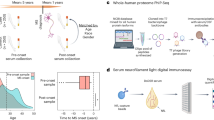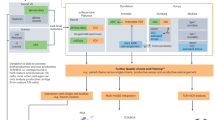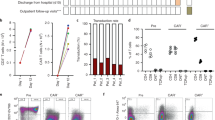Abstract
THE majority of human red cell cold agglutinins have a specificity for an antigen termed I which is present in the red cells of the vast majority of adults1. Only very occasionally does an adult lack the I antigen. The high titre anti-I cold agglutinins found in association with chronic autoimmune haemolytic anaemia and, transiently, in association with Mycoplasma pneumoniae infection are therefore autoantibodies. In human infection with Mycoplasma pneumoniae the cold agglutinin seems to be directed not against the infecting organism but against the host red cell2. The present study was undertaken to investigate whether I antigen can be detected in human tissues other than erythrocytes and hence to determine whether anti-I cold agglutinin is an organ specific or a non-organ specific antibody.
This is a preview of subscription content, access via your institution
Access options
Subscribe to this journal
Receive 51 print issues and online access
$199.00 per year
only $3.90 per issue
Buy this article
- Purchase on Springer Link
- Instant access to full article PDF
Prices may be subject to local taxes which are calculated during checkout
Similar content being viewed by others
References
Weiner, A. S., Unger, L. J., Cohen, L., and Feldman, J., Ann. Intern. Med., 44, 221 (1956).
Feizi, T., and Taylor-Robinson, D., Immunology, 30, 405 (1967).
Feizi, T., Science, 156, 1111 (1967).
Author information
Authors and Affiliations
Rights and permissions
About this article
Cite this article
FEIZI, T., MONGER, E. Search for I Antigen in Human Tissues. Nature 216, 1025–1026 (1967). https://doi.org/10.1038/2161025a0
Received:
Published:
Issue Date:
DOI: https://doi.org/10.1038/2161025a0
This article is cited by
-
Human innate B cells: a link between host defense and autoimmunity?
Springer Seminars in Immunopathology (2005)
-
Production of Cold Agglutinins in Rabbits immunized with Human Erythrocytes treated with Mycoplasma pneumoniae
Nature (1969)
Comments
By submitting a comment you agree to abide by our Terms and Community Guidelines. If you find something abusive or that does not comply with our terms or guidelines please flag it as inappropriate.



